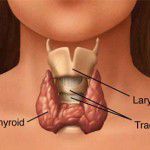 Miscarriage, premature delivery, stillbirth, brain abnormalities and low IQ are some of the complications that may affect an unborn infant if the mother has untreated thyroid disorder. So, are women at particular risk of developing thyroid disease when they are pregnant?
Miscarriage, premature delivery, stillbirth, brain abnormalities and low IQ are some of the complications that may affect an unborn infant if the mother has untreated thyroid disorder. So, are women at particular risk of developing thyroid disease when they are pregnant?
If certain known risk factors are present, the answer is: Yes. These include a family history of thyroid disease, signs and symptoms of thyroid disease, the presence of goitre, type 1 diabetes, or other autoimmune diseases.
Yet another risk factor is that the mother’s hormone levels may fluctuate during pregnancy. Thyroid disorders include the gland being under-active (hypothyroidism) or over-active (hyperthyroidism).
For the unborn infant, it is vitally important that the mother’s thyroid hormone levels be normal, especially during the first three months of pregnancy.
Here’s why: Thyroid hormones are critically important in the development of the infant’s brain. So thyroid hormones provided by the mother during the first three months of pregnancy are especially important. The infant’s thyroid becomes functional at approximately 12 weeks.
To be sure your thyroid gland is healthy, ask your doctor for a TSH (thyroid-stimulating hormone) test. This simple quick blood test is the most accurate way to diagnose a thyroid disorder.
Thyroid disorders are among the most common medical conditions in Canada. It is estimated three million Canadians have a thyroid condition – and half may be unaware of it. Hypothyroidism represents the most common thyroid disorder and affects women three times more often than it does men.
For more information: www.thyroid.ca and www.whatswrongwithme.com


